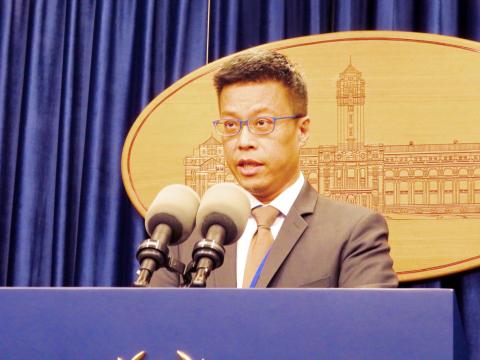The government is assessing the possibility of establishing a US border preclearance system at Taiwan Taoyuan International Airport to expedite travel by Taiwanese to the US, the Ministry of Foreign Affairs said yesterday.
Government agencies are already examining the issue and discussing how such a system could be put in place at the airport, ministry spokesman Andrew Lee (李憲章) said.
The discussions include the details of setting up a preclearance system, the application process, and the management and benefits of such a system, he said.

Photo: Lee Hsin-fang, Taipei Times
The government would closely follow developments in the US, Lee said, adding that US Customs and Border Protection has not yet opened up further applications for nations interested in establishing a preclearance system.
His comments followed a front-page report yesterday in the Chinese-language Liberty Times (the sister newspaper of the Taipei Times), which said that the US had conditionally agreed to the establishment of a border preclearance system in Taiwan.
The tentative agreement was reached during talks with China Airlines (中華航空), the nation’s largest carrier, about its new service between Taoyuan and Ontario International Airport near Los Angeles, California, which is to begin tomorrow, the Liberty Times said.
The newspaper quoted China Airlines chairman Ho Nuan-hsuan (何煖軒) as saying that the development was an “unintentional, positive outcome” stemming from the carrier’s negotiations with the US about opening the flight route.
Asked for comment, American Institute in Taiwan spokeswoman Sonia Urbom said that the US welcomes Taiwan’s interest in the border preclearance program, which is overseen by US Customs and Border Protection.
Taiwan is a member of the US’ Visa Waiver and Global Entry programs, which allow more convenient and expedited entry into the US.
Presidential Office spokesman Alex Huang (黃重諺) said Taiwan’s inclusion into the Global Entry program and any follow-up measures could make it more convenient for Taiwanese traveling to the US and bring citizens of the two nations closer together.
Washington and Taipei have been working closely on follow-up measures, Huang said, without disclosing any details.
The US has 15 border preclearance operations in six countries and territories — Ireland, Aruba, the Bahamas, Bermuda, the United Arab Emirates and Canada.
Additional reporting by Stacy Hsu

Right-wing political scientist Laura Fernandez on Sunday won Costa Rica’s presidential election by a landslide, after promising to crack down on rising violence linked to the cocaine trade. Fernandez’s nearest rival, economist Alvaro Ramos, conceded defeat as results showed the ruling party far exceeding the threshold of 40 percent needed to avoid a runoff. With 94 percent of polling stations counted, the political heir of outgoing Costa Rican President Rodrigo Chaves had captured 48.3 percent of the vote compared with Ramos’ 33.4 percent, the Supreme Electoral Tribunal said. As soon as the first results were announced, members of Fernandez’s Sovereign People’s Party

MORE RESPONSIBILITY: Draftees would be expected to fight alongside professional soldiers, likely requiring the transformation of some training brigades into combat units The armed forces are to start incorporating new conscripts into combined arms brigades this year to enhance combat readiness, the Executive Yuan’s latest policy report said. The new policy would affect Taiwanese men entering the military for their compulsory service, which was extended to one year under reforms by then-president Tsai Ing-wen (蔡英文) in 2022. The conscripts would be trained to operate machine guns, uncrewed aerial vehicles, anti-tank guided missile launchers and Stinger air defense systems, the report said, adding that the basic training would be lengthened to eight weeks. After basic training, conscripts would be sorted into infantry battalions that would take

GROWING AMBITIONS: The scale and tempo of the operations show that the Strait has become the core theater for China to expand its security interests, the report said Chinese military aircraft incursions around Taiwan have surged nearly 15-fold over the past five years, according to a report released yesterday by the Democratic Progressive Party’s (DPP) Department of China Affairs. Sorties in the Taiwan Strait were previously irregular, totaling 380 in 2020, but have since evolved into routine operations, the report showed. “This demonstrates that the Taiwan Strait has become both the starting point and testing ground for Beijing’s expansionist ambitions,” it said. Driven by military expansionism, China is systematically pursuing actions aimed at altering the regional “status quo,” the department said, adding that Taiwan represents the most critical link in China’s

‘REALLY PROUD’: Nvidia would not be possible without Taiwan, Huang said, adding that TSMC would be increasing its capacity by 100 percent Nvidia Corp CEO Jensen Huang (黃仁勳) on Saturday praised and lightly cajoled his major Taiwanese suppliers to produce more to help power strong demand for artificial intelligence (AI), capping a visit to the country of his birth, where he has been mobbed by adoring fans at every step. Speaking at an impromptu press conference in the rain outside a Taipei restaurant, where he had hosted suppliers for a “trillion-dollar dinner,” named after the market capitalization of those firms attending, Huang said this would be another good year for business. “TSMC needs to work very hard this year because I need a lot